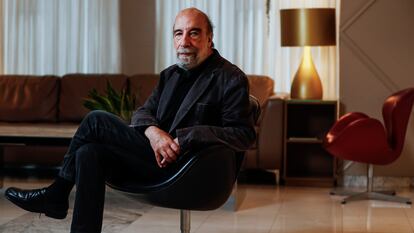Raúl Zurita, Chilean poet in Madrid, Luis Sevillano
There are poems that will always remain in the imagination, and there are others that will escape it. These are two lessons that the Chilean poet Raúl Zurita is very clear about. In the seventies, Zurita (Santiago, 71 years old) was still a stranger in the world of international letters, he survived the Pinochet dictatorship and lived with an unrealizable dream: to translate his verses into heaven. But the dream materialized in 1982, when a group of five planes captured some of his verses in the blue sky of New York. "My god is hunger / My god is snow," the celestial poem began. "My god is no," he adds.
Zurita, winner of the Reina Sofía Prize for Ibero-American Poetry last year, has just had the opposite experience: a poem that was about to escape from his head was kept in his imagination. On Friday, April 30, the Chilean was going to capture new verses in the night sky of Mexico City, with the help of a dozen drones, but the event had to be canceled due to a permitting problem. Zurita is a poet
performer
, the one who has captured his verses in the Atacama desert in the most difficult years of the dictatorship ("Ni pena ni fear"), or the one who shouts them at a rock concert three years ago ("Song of his disappeared love" ).
Zurita talks to EL PAÍS about his new poem that deals with the death of God, a requiem that his readers can only imagine in the wide sky of Mexico.
God has died, alone, and no one could go to the funeral.
More information
Raúl Zurita, Reina Sofía Prize for Ibero-American Poetry
Zurita: "It is much more difficult to build a poem than a bridge"
Question.
What was the project of illustrating a poem in the sky of Mexico?
R.
It was an invitation from UNAM for the great Book and Rose Festival. We had a great idea, to make poems in heaven, but at night. The idea fascinated me, it moved me a lot, because of the human moment that we are going through. On that night, in the largest and most populated city in the world, I imagined these poems as a kind of crying, almost a litany for this kind of abandonment. I am not especially religious, and I wanted to talk about a radical absence of God. This deep helplessness to which we, each one of us, are subjected, in which death is a death without illusion, the death of covid. A death that takes you alone, you die alone, you die without anyone, without a loved one, nothing. I think death can be an illusion, because everyone imagines how they would like to die at any given moment.But this silent, lonely death is quite a bleak, tremendous image. There are the people who are treating you in the Hospital, but regardless of that, it is not your mother, it is not your sister, it is not your son, it is not your wife, it is not your husband, it is not your grandmother. You are alone. So when it came to burying god or the death of god, I think it has never felt more present than now. Now there is nothing.
Q.
Could you share the verses for that night?
R.
My god does not wake up,
My god does not want,
My god don't feel
My god don't bleed
My god is not coming,
My god is not.
Q.
Why did you say that these are a response to the poem that you screened in New York a few years ago?
R.
40 years ago my poem in the sky of New York said "My god is hunger / My god is snow / My god is pampa."
But this is like an answer: it is not, it is not more, it is not there, it does not come.
Humanity is in an almost metaphysical abandonment.
We only have ourselves.
All these incredible efforts of science, it is said that science is a miracle, but there is no miracle.
We are we, we are humanity in this small point lost in the universe in total uncertainty regarding many lives.
At that time in New York there was the illusion that there was a god.
But in these 40 years tremendous things have also happened, we are living on a planet that we have destroyed, we have destroyed native forests, we have destroyed the environment.
So this is a nocturnal image, a very deep night, it is our night.
Our inner night, so to speak.
That is why I see it as a lament, a cry, a requiem.
Q.
It's a pretty bleak poem.
A.
Yes, it is a cry of hopelessness.
The death of God is a theme that runs throughout the nineteenth century, but it was seen coming long before, even before Nietzsche.
But now we have such impressive evidence and that is what moves me, that indeed there is no God.
For the most atheist of atheists, there is no God.
But for the most believer, there is no God either.
Q.
Although the pandemic has not ended, it has been said that we urgently need to have a collective mourning for what has happened this year.
Does poetry have that capacity?
R.
That's how I saw it.
The great poems are a space for that: they are a space for weeping, for reflection, but also for collective recollection, between what has happened to us and what is happening to us.
I think that poetry is the only thing, and the last, and the great vehicle that has always expressed those things.
Before religion, there is poetry as an act of freedom, in which you cry or laugh, in which you embrace another human being.
In that embrace all the wonder of this world is contained.
Q.
In an interview several years ago, you said that the apocalypse was not the end of humanity, but that the end of humanity was in the death of a single man.
How did that reflection evolve in the face of so many deaths during the pandemic?
R.
At that time I was referring above all to the people who were tortured and killed in Argentina, Chile, and Uruguay. When a human being is being tortured, for him the apocalypse is not something that will come, but he is in the apocalypse. Now each human being is dying alone, and if I cannot accompany him, this is the apocalypse too, this very one, it happens at this moment. Let's not wait for the end of time, because it is happening in every being that dies alone.
But I think that we should think about the end to take advantage of these seconds, this existence that we have, this radiance with which we arrive in the world, to be a little better, to be a little more supportive, to have a little more love and compassion.
The apocalypse is here, in the present, this is the end of time.
Every human being who suffers, who is in a hospital with ventilators, for that human being the apocalypse is there, in that minute.
I believe that death is an absolute fact, but there are ways to die and ways to die.
This way of dying is the saddest way one can conceive.
Q.
Why use the sky again as a sheet of paper when that is so ephemeral?
A.
There is a biblical verse, in Revelation, that says 'your names are written in heaven'.
We are all written, with our names, in heaven.
That verse impressed me a lot, because we are something that turns on for a second, they see it, and it turns off.
Almost like a call, almost like a blink.
It cannot be more than that.
But it is also like a warning, like a red light that turns on and signifies the dream of a human being, which is equal to all human beings.
I thought it was beautiful to occupy the sky as a page.
P.
Chile has experienced very strong emotions in the last two years: from the social explosion, to the very strict confinement, to the excitement of rapid vaccines, to the terrifying new peak of infections.
How have you interpreted this moment in the history of Chile?
R.
I see it as a hopeful moment politically, but extremely tough. Because 40 years ago we were told that this was the party, that neoliberalism solved all problems, that efficiency was enough. But in Chile, and not only in Chile, but in all Latin American societies, there has been so much cruelty, so much deception. All that exploded and now we talk about dignity. And that, the word “dignity”, the one that asks “look at me as a human being, look at me as what I am”, has been trampled on in the most impressive way. We cover invisible beings with 50-story buildings. It was not pretty, it was not good with a country that had emerged from a dictatorship and had to be vigorous, optimistic. But you can't take that much away from people. People went out on the street, and people are ready to go out again.
Q.
Any other
new
performances
you are working on during the pandemic?
R.
There is a project that I have been working on for many years, that we were going to do this year, on the cliffs.
The north coast of Chile is an impressive coastline, they are abysses that fall 1,000 meters downwards, and the idea is 22 verses projected on those cliffs.
It will be done at night, with light projections, but I think it will no longer be this year, due to the pandemic.
Hopefully I can do it, hopefully life can give me that.
It will end with a very sad phrase.
These are some of those verses:
You will see a sea of stones
You will see daisies in the sea
You will see a hungry God,
You will see the hunger
You will see a country of thirst,
You will see not see
And you will cry
Subscribe here
to the
EL PAÍS América
newsletter
and receive all the informative keys of the current situation in the region.







/cloudfront-eu-central-1.images.arcpublishing.com/prisa/IH72ZOEZVZACPKRCKFSYZMVO7M.jpg)
/cloudfront-eu-central-1.images.arcpublishing.com/prisa/N4O37K6I4JEPFGZ3DPAG34OT4I.jpg)